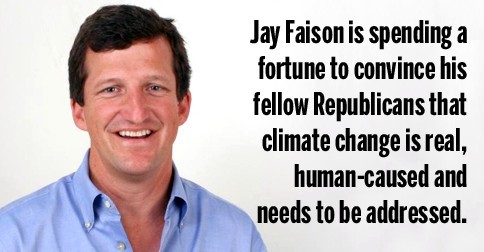For too long, climate change has been a partisan issue in American politics. In spite of the overwhelming scientific data about the role that human beings have played in the warming of the planet, the Republican Party of the United States has consistently refused to acknowledge the scientific consensus, and even their presumptive nominee for the presidency this year has outright denied the existence of climate change and repeatedly referred to it as a “hoax.”
But here’s where things get interesting: The Republican denial of climate change is far more prevalent in elected Republicans than average conservative voters. In fact, the latest round of polling shows that close to half of Republican voters accept the scientific consensus on climate change, which is an increase of nearly 20% over the last 2 years on this issue. So there is obviously a sharp divide between the views of the voters and the views of Republican politicians.
This divide can mostly be explained by following the money. According to Open Secrets, since the mid-1990’s, at least 75% of the political contributions from the oil and gas industries went to Republicans, with more than 87% going to Republicans over Democrats in the 2012, 2014, & 2016 elections. The total amount given by these industries is in the hundreds of millions.
In response to this flood of fossil fuel money, a conservative climate activist named Jay Faison has decided to fight fire with fire, and has personally pledged to spend $5 million through his ClearPath political action fund to help elect Republicans who want to fight climate change.
Faison laid out his ideas in an interview posted by The New York Times: “What we’re trying to do is prove to the party, through these races, that clean energy wins races, to build a political safe space for the Republican Party to talk about this.”
Faison’s ClearPath fund has already announced plans to back two incumbent Senate Republicans and three Incumbent Republican members of the House of Representatives, and all are currently in very tight races.
As The New York Times points out, Democrats are beginning to use climate change denial against Republican candidates, tying both the anti-environmental stances of Republican lawmakers like James Inhofe and Mitch McConnell to the entire Party. Faison is hoping to prove that environmentalism knows no Party limit, and that you can still be a Republican and an environmentalist.
But there is one drawback to Faison’s plan, and that is that some of the candidates he’s backing have not necessarily followed through on their promises to fight for the environment.
For example, Representative Carlos Curbelo from Florida has spoken extensively about the need to address climate change while also opposing President Obama’s Clean Power Plan that would reduce carbon emissions and cut down on pollution. According to Curbelo, the plan puts too many restrictions on businesses, and that always trumps environmental protection.
The same can be said of ClearPath’s decision to help Senator Kelly Ayotte, who has acknowledged that climate change is real, but has also stated that mitigating climate change should not cost us any jobs. Ayotte also voted against allowing the EPA to regulate greenhouse gases and voted in favor of increasing domestic oil and gas drilling. Ayotte has a 23% rating from the League of Conservation Voters, which the group says indicates that she is an anti-environmental candidate.
The road ahead is very tough for ClearPath and Faison, as it appears a Herculean task to find a Republican candidate that actually has a pro-environmental record beyond their rhetoric. That fact aside, his heart is certainly in the right place because climate change cannot continue to be a partisan issue — the implications of ignoring the problem will affect every one of us, regardless of our political affiliation.
Image via EcoWatch.
Subscribe to our newsletter
Stay up to date with DeSmog news and alerts







